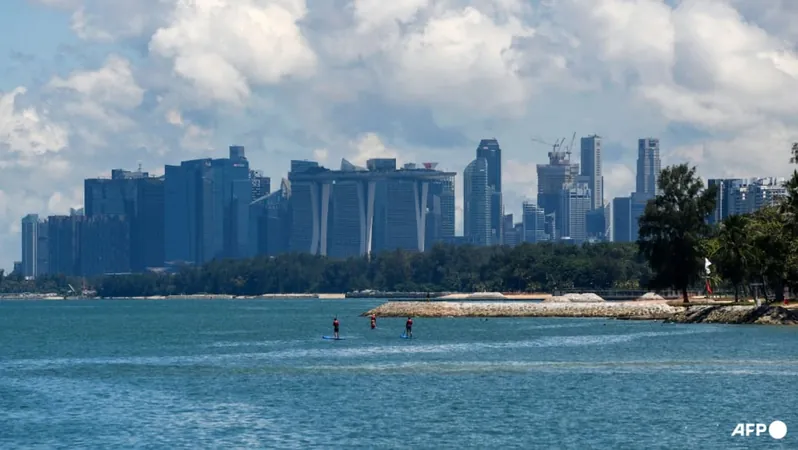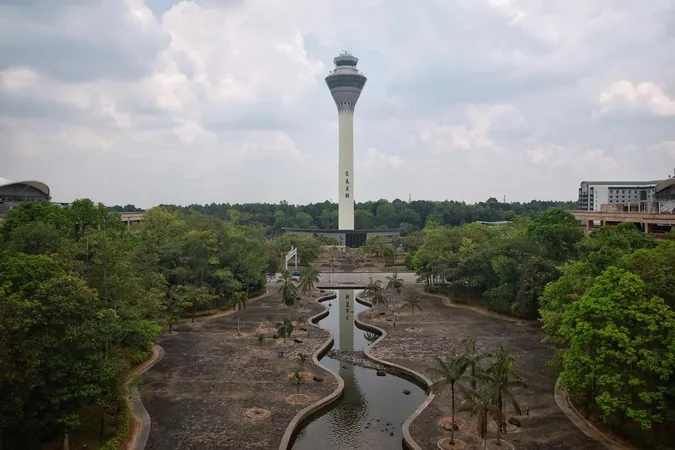
Alarming NTU Study Predicts Global Sea Levels Could Skyrocket by 1.9m by 2100 – A Warning We Can't Ignore!
2025-01-28
Author: Sarah
SINGAPORE: In a groundbreaking study led by researchers from Singapore's Nanyang Technological University (NTU) and The Netherlands' Delft University of Technology, scientists have revealed a shocking prediction that global sea levels could rise by as much as 1.9 meters by the year 2100. This alarming figure far exceeds the United Nations' current estimates, igniting concerns about the future of our coastal communities.
As the Earth's temperature continues to rise due to escalating carbon emissions, the study indicates that under a high emissions scenario, sea levels could rise somewhere between 0.5 meters and 1.9 meters by the century's end. This high-end estimate is a staggering 0.9 meters more than the UN's latest projections, which anticipate a rise of approximately 0.63 to 1.01 meters in the same timeframe, as reported in the Intergovernmental Panel on Climate Change (IPCC) sixth assessment report.
A Revolutionary "Fusion" Approach
Published in the scientific journal Earth's Future, the study titled “Fusion of Probabilistic Projections of Sea-Level Rise" introduces a revolutionary methodology to tackle uncertainties in current sea level predictions. Lead author and NTU senior research fellow Benjamin Grandey explained that while existing models effectively simulate well-understood climate processes, they often overlook critical factors that could accelerate ice sheet melting.
In contrast, expert opinions can shed light on these less certain scenarios. The NTU team's innovative approach combines data from IPCC reports with expert assessments, creating a comprehensive model that provides a broader range of possible outcomes and enhances the reliability of extreme sea level rise projections.
The Urgent Need for Proactive Measures
The implications of this research are dire for coastal cities worldwide. With over 410 million people potentially at risk from rising sea levels by the end of the century, governments and urban planners must initiate proactive measures to mitigate the impacts. Notably, engineers and city planners are urged to rethink infrastructure designs in light of a possible 1.9-meter increase, which could drastically change coastal landscapes.
The melting of ice sheets in Greenland and Antarctica has accelerated, prompting fears that communities along shorelines face devastating floods and property loss. Singapore, located just a few meters above sea level in many areas, is particularly vulnerable, with approximately 30% of its land standing less than 5 meters above the mean level.
Local Repercussions and Future Research
While the study primarily focused on global predictions, the NTU research team is now working on regional projections, including those for Singapore, which will be published in upcoming studies in collaboration with the Centre for Climate Research Singapore. Current projections indicate that Singapore’s sea level could rise by 0.23 meters under low emissions or up to 1.15 meters under a high emissions scenario by 2100.
Extreme weather events, high tides, and storm surges could exacerbate this situation, potentially elevating sea levels by an additional 4 to 5 meters, placing low-lying areas at imminent risk of flooding.
With this new study serving as a stark warning, both local and global communities must come together to address the escalating climate crisis. The time to act is now—before the impending rise in sea levels transforms our coastlines forever!




 Brasil (PT)
Brasil (PT)
 Canada (EN)
Canada (EN)
 Chile (ES)
Chile (ES)
 Česko (CS)
Česko (CS)
 대한민국 (KO)
대한민국 (KO)
 España (ES)
España (ES)
 France (FR)
France (FR)
 Hong Kong (EN)
Hong Kong (EN)
 Italia (IT)
Italia (IT)
 日本 (JA)
日本 (JA)
 Magyarország (HU)
Magyarország (HU)
 Norge (NO)
Norge (NO)
 Polska (PL)
Polska (PL)
 Schweiz (DE)
Schweiz (DE)
 Singapore (EN)
Singapore (EN)
 Sverige (SV)
Sverige (SV)
 Suomi (FI)
Suomi (FI)
 Türkiye (TR)
Türkiye (TR)